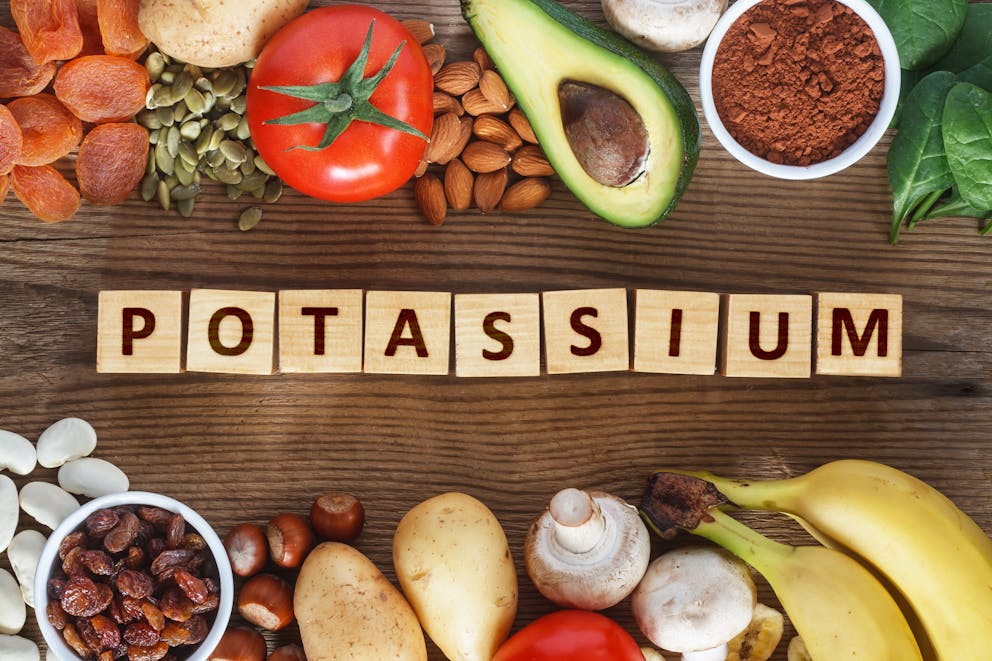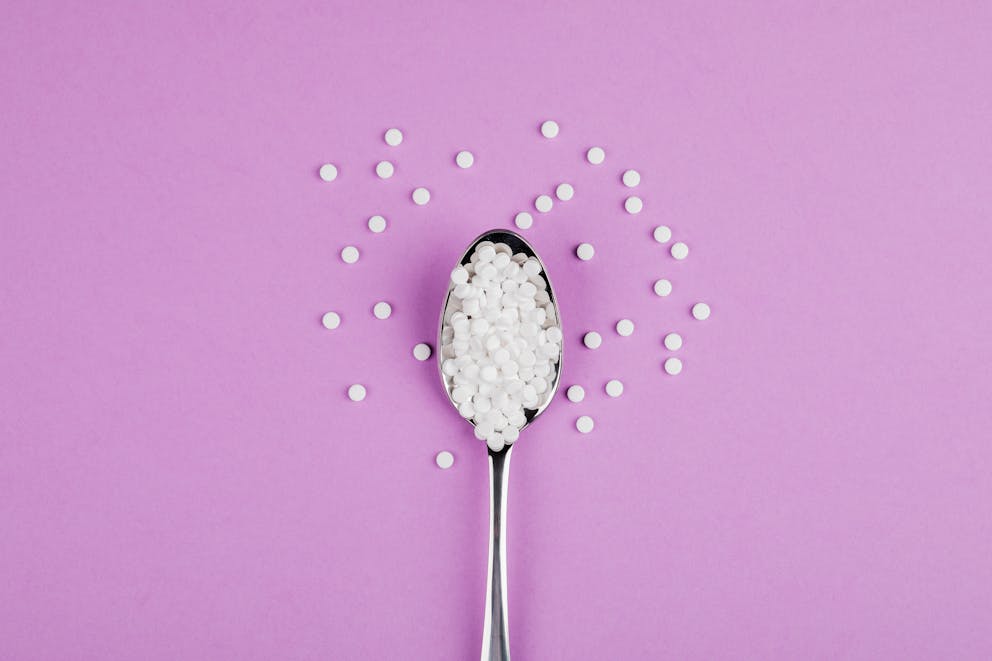Potassium Controls Vascular Calcification
Understanding the importance of potassium for vascular health is crucial in maintaining a heart-healthy lifestyle. This essential nutrient protects cardiac health, averts cardiovascular issues, and controls hypertension.
Potassium plays a crucial role in promoting vascular health and maintaining clear arteries. Adequate potassium intake supports optimal muscle function, regulates blood pressure, and reduces the risk of cardiovascular diseases.
Inflammation and oxidation contribute to arterial calcium build-up, leading to potential cardiovascular events compared to those with higher antioxidant levels.
Learn about preventive measures against vascular diseases - including ways to increase your intake of vitamins D & C along with potassium for optimal vascular health.
Understanding the Role of Potassium in Vascular Calcification
Potassium, a key mineral known for its heart-healthy benefits, helps keep arteries clear and your cardiovascular system running smoothly.
When you don't get enough potassium, your arteries can start to stiffen up due to calcium buildup, a condition known as vascular calcification.
The connection between low dietary potassium and vascular calcification
Research suggests that low potassium intake may increase the risk of vascular calcification, which can lead to problems like reduced blood flow and heart disease, making it important to ensure you're getting enough potassium in your diet.
Vascular calcification isn't just a concern for those with kidney disease; it can also occur with aging, diabetes, or high blood pressure, emphasizing the importance of maintaining adequate potassium levels for overall heart health.
Importance of sufficient potassium intake for heart health
Looking to maintain a healthy heart? It's time to embrace potassium-rich foods. Not only do they support artery flexibility, but they also work wonders in keeping blood pressure in check – a crucial factor in heart health.
Add avocados, wild-caught salmon, and leafy greens to your diet to ensure a high enough potassium intake.
When it comes to potassium, opt for natural sources over supplements. Whole foods not only enhance nutrient absorption but also provide additional health benefits.
Potassium plays a vital role in preventing vascular calcifications, but moderation is key. Excessive potassium intake can lead to hyperkalemia, a condition that can disrupt heart function. So, strike a balance and prioritize a well-rounded approach to heart health.

Potassium's Impact on Blood Pressure
Hypertension, a widespread health issue, can result in dangerous cardiovascular problems if not kept in check. Boosting your potassium intake is a natural way to help control this condition. This essential mineral plays a crucial role in maintaining healthy blood pressure levels.
How Does Potassium Help Manage High Blood Pressure?
Studies have shown that potassium relaxes blood vessel walls and helps eliminate excess sodium through urine, lowering blood pressure. The American Heart Association recommends that adults without kidney problems consume 4,700 milligrams daily.
Other sources of potassium besides bananas include avocados, sweet potatoes, spinach, and beans.
Consult a healthcare provider before considering potassium supplements.
In addition to dietary changes, regular exercise and limiting alcohol consumption can further assist in managing hypertension effectively.
The Role of Vitamin D in Controlling Hypertension
Vitamin D is also linked to regulating blood pressure levels. It works with calcium to ensure proper absorption, indirectly aiding heart function and maintaining a regular heartbeat rhythm.
Research suggests that individuals deficient in vitamin D may have a higher risk of developing hypertension.
Spend time outdoors under the sun daily to naturally produce vitamin D in your skin cells.
Increase your intake of fatty fish like salmon or mackerel, fortified dairy products, and egg yolks.
Remember, stress management is equally important in controlling high blood pressure. Practice mindfulness techniques such as yoga or meditation regularly for better heart health.
Inflammation and Oxidation - Arterial Calcium Build-up
Inflammation is our body's alarm system, and when it lingers, it spells trouble, particularly for our heart health. Let's delve into the intricate relationship between inflammation, oxidation, and the accumulation of calcium in our arteries.
The Inflammation-Arterial Calcium Relationship
When inflammation strikes our arteries, it's akin to rolling out the red carpet for calcium deposits. These deposits morph into rigid plaques, obstructing blood flow and paving the way for conditions like arteriosclerosis and coronary artery disease.
But why does inflammation beckon calcium? When our artery walls undergo inflammation due to factors like high blood pressure or cholesterol, our immune system dispatches white blood cells as reinforcements. These cells ingest LDL cholesterol particles, forming what's known as foam cells.
However, upon their demise, these foam cells leave behind their fatty residue, which eventually solidifies into those troublesome plaques.
Oxidation and Antioxidants
Oxidative stress emerges as a significant contributor that accelerates inflammation and plaque formation within our arteries. This phenomenon arises from an imbalance between free radicals and antioxidants in our system.
Oxidized LDL Cholesterol: Free radicals have a penchant for altering LDL cholesterol, prompting it to adhere to artery walls and exacerbating inflammation and plaque formation.
Low Antioxidant Levels: In the absence of adequate antioxidants in our diet, free radicals wreak havoc, inducing oxidative stress and causing disruption within our arteries.
To safeguard cardiovascular health, it is imporatnt to monitor LDL cholesterol levels and ensure sufficient antioxidant intake.
Whether achieved through a balanced diet or supplements, antioxidants play a pivotal role in neutralizing free radicals, stopping inflammation and plaque formation, and ultimately promoting heart health.
Diet Choices That Can Lead To Artery Inflammation
Watch out for these artery enemies hiding in your food.

The Impact of Excessive Sugar Consumption on Artery Health
Sugar is sweet, but too much can cause trouble for your arteries. Studies show that too many sugary treats can lead to inflammation and plaque buildup in your blood vessels.
Processed Foods: Commonly, processed foods are loaded with added sugars, so opt for unprocessed foods whenever possible..
Sugary Drinks: Sodas and sweetened beverages are very high in sugar and should be avoided for heart health.
Candy & Desserts: Candy and desserts are very high in sugar content and make it difficult to maintain a healthy arterial system..
Dangers Associated With Overconsumption Of Refined Flour Products
While white flour may seem harmless, it can have detrimental effects on your cardiovascular health. Consuming refined grains leads to rapid spikes in blood sugar levels, which in turn trigger inflammatory responses within the body.
Pastries & Baked Goods: These high-calorie treats, often made from white flour, pose risks to heart health and should be consumed in moderation.
Pasta & White Bread: Opt for alternatives to refined wheat products to promote arterial health and reduce the risk of inflammation.
Cereal Bars: Despite their perceived healthiness, many cereal bars contain processed grains and added sugars, contributing to potential cardiovascular issues.
It's crucial to be mindful of dietary choices, as reducing sugar and refined flour intake can help safeguard against arterial inflammation and prevent conditions such as vascular calcification.
Preventive Measures Against Vascular Calcification
Your body's vascular health is crucial for overall wellness. Prevent arterial stiffness and calcifications by boosting antioxidant levels and increasing vital nutrients like potassium, vitamin D, and vitamin C intake.
Boost Antioxidant Levels with Diet Modification
A balanced diet rich in antioxidants is crucial for preventing vascular diseases. Combat inflammation and the accumulation of arterial calcium by incorporating foods such as berries, nuts, dark chocolate, spinach, and beets into your meals while minimizing processed food consumption.
Increase Vitamin D & C Intake
Vitamin D contributes to lowering blood pressure, while vitamin C supports collagen production for healthy arteries. Boost your vitamin D levels by spending 10-15 minutes in the midday sun or consuming fatty fish like salmon and mackerel. Obtain vitamin C from sources such as peppers and broccoli.
Regular exercise is also important, as it enhances circulation, reduces cholesterol levels, and aids in weight management, promoting overall heart health.
Adopting habits like quitting smoking, moderating alcohol intake, and prioritizing sufficient sleep is beneficial for maintaining vascular health and preventing artery calcification.
Since individual nutritional requirements vary, it's advisable to seek guidance from a healthcare professional before embarking on any dietary changes, especially if you have underlying medical conditions. They can offer personalized recommendations to ensure optimal nutrient absorption and long-term heart health.
Conclusion
Recognizing the significance of potassium in vascular health is paramount for maintaining a strong heart and preventing conditions such as vascular calcification. Studies have linked low dietary potassium intake to a heightened risk of arterial calcium accumulation.
Ensuring adequate potassium intake can effectively help manage high blood pressure, so consider adding potassium-rich foods like avocados to your diet. Additionally, incorporating potassium-rich options such as spinach can aid in reducing inflammation, contributing to overall cardiovascular well-being.
Supporting Data
Previous blog
The Best Mineral for Strong BonesNext blog
The Mid-Back Stress ConnectionTags

Popular
08/21/2024
55K views
02/23/2025
46.3K views
11/18/2024
277.5K views
03/18/2024
11/21/2022




